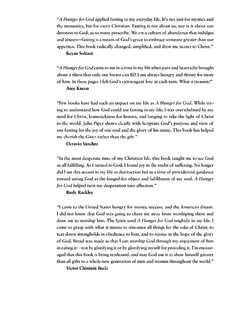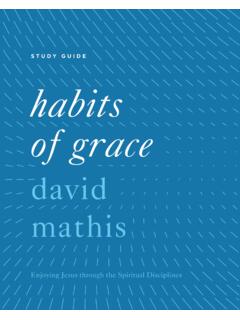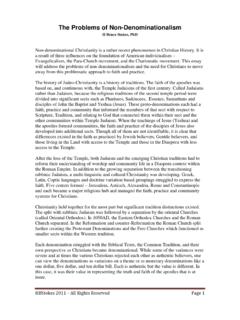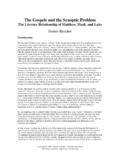Transcription of 9781781912522- Five Points - Desiring God
1 Scripture quotations are from The Holy Bible, English Standard Version, copyright 2001 by Crossway Bibles, a division of Good News Publishers. Used by permission. All rights reserved. ESV Text Edition: 2007. The Desiring God Foundation 2013. paperback ISBN 978-1-78191-252-2. epub ISBN 978-1-78191-284-3. Mobi ISBN 978-1-78191-285-0. 10 9 8 7 6 5 4 3 2 1. Published in 2013. by Christian Focus Publications Ltd., Geanies House, Fearn, Ross-shire, IV20 1TW, Scotland, Great Britain Cover design by Printed and bound in the USA. All rights reserved. No part of this publication may be reproduced, stored in a retrieval system, or transmit- ted, in any form, by any means, electronic, mechanical, photocopying, recording or otherwise, without the prior permission of the publisher or a licence permitting restricted copying. In the such licences are issued by the Copyright Licensing Agency, Saffron House, 6-10 Kirby Street, London, EC1 8TS www.
2 CONTENTS. 1. Preface ..7. 2. Historical Roots ..11. 3. Total Depravity ..17. 4. Irresistible 5. Limited Atonement ..37. 6. Unconditional Election ..53. 7. Perseverance of the Saints ..63. 8. What the Five Points Have Meant for Me: A Personal Testimony ..77. 9. Concluding Testimonies ..85. 10. A Final Christians love God. He is our great Treasure, and nothing can compare with him. One of the great old catechisms says, God is a Spirit, infinite, eternal, and unchangeable, in his being, wisdom, power, holiness, justice, goodness, and truth. 1. This is the One we love. We love the whole panorama of his perfections. To know him, and be loved by him, and become like him is the end of our soul's quest. He is our exceeding joy (Ps. 43:4). He is infinite and that answers our longing for completeness. He is eternal and that answers our longing for permanence. He is unchangeable and that answers our longing for stability and security.
3 There is none like God. Nothing can compare with him. Wealth, sex, power, popularity, conquest, productivity, great achievement nothing can compare with God. When the Fog Clears The more you know him, the more you want to know him. The more you feast on his fellowship, the hungrier you are for deeper, richer communion. Satisfaction at the deepest levels 1 Westminster Shorter Catechism, Question Four. 7. FIVE Points . breeds a holy longing for the time when we will have the very power of God to love God. That's the way Jesus prays for us to his Father: That the love with which you have loved me may be in them (John 17:26). That is what we long for: the very love the Father has for the Son filling us, enabling us to love the Son with the magnitude and purity of the love of the Father. Then the frustrations of inadequate love will be over. Yes, the more you know him and love him and trust him, the more you long to know him.
4 That's why I have written this little book. I long to know God and enjoy God. And I want the same for you. The great old catechism asks, What is the chief end of man? and answers, Man's chief end is to glorify God and enjoy him forever. 2 Enjoying God is the way to glorify God, because God is most glorified in us when we are most satisfied in him. But to enjoy him we must know him. Seeing is savoring. If he remains a blurry, vague fog, we may be intrigued for a season. But we will not be stunned with joy, as when the fog clears and you find yourself on the brink of some vast precipice. Worthwhile Wrestling My experience is that clear knowledge of God from the Bible is the kindling that sustains the fires of affection for God. And probably the most crucial kind of knowledge is the knowledge of what God is like in salvation. That is what the five Points of Calvinism are about.
5 Not the power and sovereignty of God in general, but his power and sovereignty in the way he saves people. That is why these Points are sometimes called the doctrines of grace. To experience God fully, we need to know not just how he acts in general, but specifically how he saves us how did he save me? 2 Westminster Shorter Catechism, Question One. 8. PREFACE. I do not begin as a Calvinist and defend a system. I begin as a Bible-believing Christian who wants to put the Bible above all systems of thought. But over the years many years of struggle I. have deepened in my conviction that Calvinistic teachings on the five Points are biblical and therefore true, and therefore a precious pathway into deeper experiences of God's grace. My own struggle makes me more patient with others who are on the way. And in one sense, we are all on the way. Even when we know things biblically and truly things clear enough and precious enough to die for we still see through a glass dimly (1 Cor.)
6 13:12). There can be many tears as we seek to put our ideas through the testing fires of God's word. But all the wrestling to understand what the Bible teaches about God is worth it. God is a rock of strength in a world of quicksand. To know him in his sovereignty is to become like an oak tree in the wind of adversity and confusion. And along with strength is sweetness and tenderness beyond imagination. The sovereign Lion of Judah is the sweet Lamb of God. My Prayer for You I pray you will be helped. Please don't feel that you have to read these short chapters in any particular order. Many of you will want to skip the historical introduction because it is not as immediately relevant to the biblical questions. There is an intentional order to the book, but feel free to start wherever it looks most urgent for you. If you get help, then you will be drawn back to the rest of it.
7 If you don't, well, then just return to the Bible and read it with all your might. That is where I hope you will end up anyway: reading and understanding and loving and enjoying and obeying God's word, not my word. I pray that because of our meeting here you will move Towards a Deeper Experience of God's Grace.. 9. John Calvin, the famous theologian and pastor of Geneva, died in 1564. Along with Martin Luther in Germany, he was the most influential force of the protestant reformation . His commentaries and Institutes of the Christian Religion are still exerting tremendous influence on the Christian church worldwide. The churches which have inherited the teachings of Calvin are usually called Reformed as opposed to the Lutheran or Anglican/Episcopalian branches of the reformation . While not all Baptist churches hold to a Reformed theology, there is a significant Baptist tradition which flowed out of that stream and still cherishes the central doctrines inherited from the Reformed branch of the reformation .
8 Arminius and the Remonstrants The controversy between Arminianism and Calvinism arose in Holland in the early 1600s. The founder of the Arminian party was Jacob Arminius (1560 1609). He studied in Geneva under Calvin's successor, Theodore Beza, and became a professor of theology at the University of Leyden in 1603. Gradually Arminius came to reject certain Calvinist teachings. The controversy spread all over Holland, where the Reformed 11. FIVE Points . Church was the overwhelming majority. The Arminians drew up their creed in Five Articles, and laid them before the state authorities of Holland in 1610 under the name Remonstrance, signed by forty-six ministers. The official Calvinistic response came from the Synod of Dort which was held November 13, 1618, to May 9, 1619, to consider the Five Articles. There were eighty-four members and eighteen secular commissioners. The Synod wrote what has come to be known as the Canons of Dort.
9 These are still part of the church confession of the Reformed Church in America and the Christian Reformed Church. They state the Five Points of Calvinism in response to the Five Articles of the Arminian Remonstrants. So the so-called Five Points were not chosen by the Calvinists as a summary of their teaching. They emerged as a response to the Arminians who chose these five Points to disagree with. At the Heart of Biblical Theology It is more important to give a positive biblical position on the five Points than to know the exact form of the original controversy. These five Points are still at the heart of biblical theology. They are not unimportant. Where we stand on these things deeply affects our view of God, man, salvation, the atonement, regeneration, assurance, worship, and missions. Somewhere along the way (nobody knows for sure when or how), the five Points came to be summarized in English under the acronym TULIP.
10 T Total depravity U Unconditional election L Limited atonement I Irresistible grace P Perseverance of the saints 12. HISTORICAL ROOTS. I make no claim that these five Points exhaust the riches of Reformed theology. Numerous writers, especially those with a more Presbyterian orientation, make that point today because so many people (like me, a Baptist) are called Calvinists while not embracing all aspects of the Reformed tradition. For example, Richard Muller in his book, Calvin and the Reformed Tradition,1. and Kenneth J. Stewart in Ten Myths About Calvinism2 make clear that Calvin and the system of rivers that flowed from his labors are wider and deeper and more multi-faceted than the five streams I am focusing on here. These five Points are focused on the central act of God's saving sinners. Nor do I make the claim that these titles for the five doctrines of grace are the best titles.













